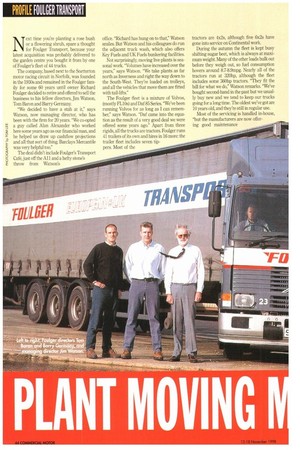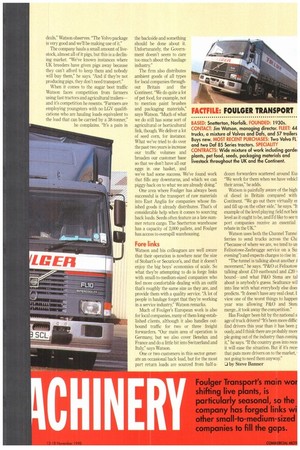PROFILE PEER TONSPORT N ext time you're planting a rose bush
Page 46

Page 47

If you've noticed an error in this article please click here to report it so we can fix it.
or a flowering shrub, spare a thought for Foulger Transport, because your latest acquisition was probably delivered to the garden centre you bought it from by one of Foulger's fleet of 44 trucks.
The company, based next to the Snetterton motor racing circuit in Norfolk, was founded in the 1930s and remained in the Foulger family for some 60 years until owner Richard Foulger decided to retire and offered to sell the business to his fellow directors, Jim Watson, Tom Baron and Barry Germany.
"We decided to have a stab at it," says Watson, now managing director, who has been with the firm for 20 years. "We co-opted ittl a guy called Alan Alexander who worked _., m here some years ago as our financial man, and o 1; he helped us draw up cashflow projections f. and all that sort of thing, Barclays Mercantile i
I was very helpful too," 8 The deal didn't include Foulger 's Transport ,c5 Cafe, just off the All and a hefty stone's E throw from Watson's
office. "Richard has hung on to that," Watson smiles. But Watson and his colleagues do run the adjacent truck wash, which also offers Key Fuels and UK Fuels bunkering facilities.
Not surprisingly, moving live plants is seasonal work "Volumes have increased over the years," says Watson. "We take plants as far north as Inverness and right the way down to the South-West. They're loaded on trolleys, and all the vehicles that move them are fitted with tail-lifts."
The Foulger fleet is a mixture of Volvos, (mostly FL10s) and Daf 85 Series. "We've been running Volvos for as long as I can remember," says Watson. "Dot came into the equation as the result of a very good deal we were offered some years ago." Apart from three rigids, all the trucks are tractors. Foulger runs 41 trailers of its own and hires in 16 more: the trailer fleet includes seven tippers. Most of the
tractors are 4x2s, although five 6x2s have gone into service on Continental work During the autumn the fleet is kept busy shifting sugar beet, which is always at maximum weight. Many of the other loads bulk out before they weigh out, so fuel consumption hovers around 81-8.9mpg. Nearly all of the tractors run at 320hp, although the fleet includes some 360hp tractors. They fit the bill for what we do," Watson remarks. "We've bought second-hand in the past but we usually buy new and we tend to keep our trucks going for a long time. The oldest we've got are 10 years old, and they're still in regular use.
Most of the servicing is handled in-house, "hut the manufacturers are now offer ing good maintenance deals," Watson observes. "The Volvo package is very good and we'll be making use of it."
The company hauls a small amount of livestock, almost all of it pigs, but this is a declining market. "We've known instances where UK breeders have given pigs away because they can't afford to keep them and nobody will buy them," he says. "And if they're not producing pigs, they don't need transport" When it comes to the sugar beet traffic Watson faces competition from farmers using fast tractors and agricultural trailers— and it's competition he resents. "Farmers are employing youngsters with no LGV qualifications who are hauling loads equivalent to the load that can be carried by a 38-tonner," he complains. "It's a pain in the backside and something should be done about it. Unfortunately, the Government doesn't seem to care too much about the haulage industry" The firm also distributes ambient goods of all types for local companies throughout Britain and the Continent. "We do quite a lot of pet food, for example, not to mention paint brushes and packaging materials," says Watson. "Much of what we do still has some sort of agricultural or horticultural link, though. We deliver a lot of seed corn, for instance. What we've tried to do over the past two years is increase our traffic volumes and broaden our customer base so that we don't have all our eggs in one basket, and we've had some success. We've found work that fills any downturns, and which we can piggy-back on to what we are already doing."
One area where Foulger has always been successful is the transport of raw materials into East Anglia for companies whose finished goods it already distributes. That's of considerable help when it comes to sourcing back loads. Seeds often feature as a late summer return cargo. The Snetterton warehouse has a capacity of 2,000 pallets, and Foulger has access to overspill warehousing.
Fore links
Watson and his colleagues are well aware that their operation is nowhere near the size of Stobart's or Securicor's, and that it doesn't enjoy the big boys' economies of scale. So what they're attempting to do is forge links with small-to-medium-sized companies who feel more comfortable dealing with an outfit that's roughly the same size as they are, and provide them with a quality service. "A lot of people in haulage forget that they're working in a service industry," Watson remarks.
Much of Foulger's European work is also for local companies, many of them long-established clients, although it also handles outbound traffic for two or three freight forwarders. "Our main area of operation is Germany, but we also cover Benelux and France and do a little bit into Switzerland and Italy," says Watson.
One or two customers in this sector generate an occasional back load, but for the most part return loads are sourced from half-a
dozen forwarders scattered around Eut "We work for them when we have vehicl their areas," he adds.
Watson is painfully aware of the high of diesel in Britain compared with Continent. "We go out there virtually et and fill up on the other side." he says. "It example of the level playing field not beit level as it ought to be, and I'd like to see n port companies receive an essential rebate in the UK."
Watson uses both the Channel Tunne ferries to send trucks across the Chz ("because of where we are, we tend to us Felixstowe-Zeebrugge service on a Sul evening") and expects charges to rise in
The tunnel is talking about another movement," he says. "MO at Felixstow talking about £10 eastbound and £20 s bound and what MO Stella are tal about is anybody's guess. Seafrance wil into line with what everybody else doe:, predicts. "It doesn't have any real clout. view one of the worst things to happen year was allowing MO and Sten merge...it took away the competition."
Has Foulger been hit by the national s age of truck drivers? "It's been more diffic find drivers this year than it has been r. ously, and I think there are probably more pie going out of the industry than comirq it," he says. "If the country goes into rece it will ease the situation. But if it's rece that puts more drivers on to the market, not going to need them anyway" Ui by Steve Banner FACTFILE: FOULGER TRANSPORT BASED: Snetterton, Norfolk. FOUNDED: 1930s. CONTACT: Jim Watson, managing director. FLEET: 44 trucks, a mixture of Volvos and Dafs, and 57 trailers Buys new. MOST RECENT PURCHASES: Two Volvo FL and two Daf 85 Series tractors. SPECIALITY CONTRACTS: Wide mixture of work including garde plants, pet food, seeds, packaging materials and livestock throughout the UK and the Continent.




















































































































